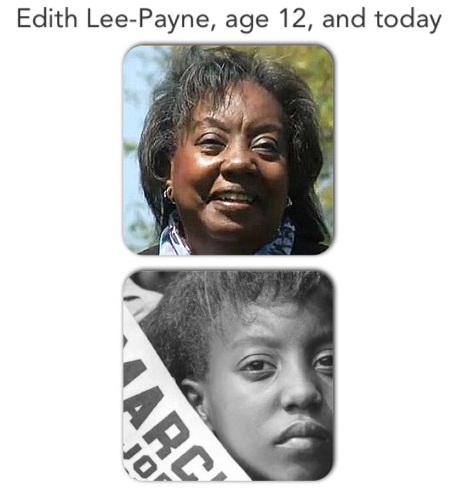AARP Hearing Center

Today, the nation reflects on the civil rights movement and race relations as we mark the 50 th anniversary of the March on Washington and Dr. Martin Luther King Jr.’s evocative “ I Have a Dream” speech.
To commemorate, AARP brings you the words—and voices—of six people who were there that day and participated in the march. The six include: Edith Lee-Payne (pictured at left), a 12-year-old girl from Detroit; Gordon H. “Gunny” Gundrum, a U.S. Park Ranger chosen to guard Dr. King on the podium; Rosemary McGill, a teenage activist from the South; Rev. C.T. Vivian, a King confidante who was beaten by police during previous protests, including one in Selma, Alabama; Rowland Scherman, a photographer for the United States Information Agency and the man who took the photo of then-12-year-old Edith Lee-Payne–-though he didn’t meet her until this year--and Philip Stone, a Bronx native who at 16 hitchhiked to the event in Washington and later became a criminal defense attorney specializing in civil liberties. All share their remembrances with AARP and describe the impact the March had on their lives.
Dr. King's Studies in Massachusetts
Massachusetts holds a special place in the life of Dr. King: After coming to Boston University in 1951, four years later, King earned his Ph.D. in systematic theology from B.U.
Participate in a Discussion About Race Relations Today
But have improvements in race relations in this country been as fully realized as Dr. King would have wishes, these 50 years later? This question is discussed in an article written for AARP The Magazine by NPR correspondent Michele Norris about how the country and race relations have changed—or not. Norris publishes The Race Card Project, a blog where she invites people to write—in just six words—what thoughts and feelings come to mind when thinking about the word “Race.”
Where Were You 50 Years Ago Today?
As with most seminal moments in history, most of us age 50+ remember where we were and what we were doing when we learned on April 4, 1968 that Dr. King had been assassinated. Share those remembrances with others on the AARP Discussion Board: Where Were You the Day Martin Luther King Jr. Was Shot?
Do Something: Create the Good Where You Live or Work
Looking to take action in honor of Dr. Martin Luther King, Jr.? Begin by giving back right where you live or work through AARP’s Create the Good initiative. While the site served as an organizing platform for a National Day of Service in Dr. King's honor--to coincide with the inauguration of President Barack Obama--the site has link to finding service projects in your own community.
For other volunteering opportunities, consider joining with AARP as a VISTA volunteer. Or provide literacy coaching to kids in Boston neighborhoods through Generations Incorporated, the local affiliate of AARP's Experience Corps.
The staff of AARP Massachusetts would love to hear from you! Email us at ma@aarp.org.































































